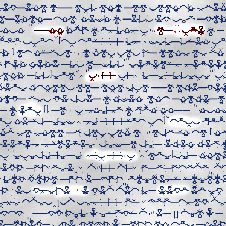Suggested Reading
Bruce Sterling: Schismatrix
A mankind diverging along technological lines, split apart by the huge changes to human nature brought by bionics, genetic engineering and spaceflight. Sets the mood of the campaign quite well.
Greg Egan: Quarantine
Great description of how the Li might be experienced by one of its victims. Also several good ideas for implants and psychodesign, as well as some hints of how bizarre quantum minds could be. Many of Egan's short stories and novels contain very useful ideas for BIGV.
Vernor Vinge: A Deepness in the Sky
The prequel of A Fire Upon The Deep (set just 30,000 years before it), describing a fairly plausible if limited future – lots of useful ideas. The Queng Ho interstellar trade network is perfect inspiration for the Process and maybe the Atlanteans. Many of the technologies (including Focus) are possible in this setting.
Vernor Vinge: A Fire Upon The Deep
"Son of space opera" – space opera, but with an updated technological level and trickier moral situations. Vinge has many good descriptions of how two species can synergise, as well as many ideas for just how weird and remote advanced civilisations may become. The colonies are much like the Beyond, while the solar system now is in the Transcend. Is there a Blight on Pi3?
Peter F. Hamilton: The Reality Dysfunction, The Neutronium Alchemist, The Naked God
Another "Son of space opera". Hamilton has created an universe with plenty of different worlds and cultures; if you strip the main plot of its metaphysical overtones it becomes good material for the Li. Lots of characters, adventures and story ideas. The Edenists have many similarities with the Arcadians and Unity.
Walter John Williams, Aristoi
Describes a society run by people employing both cognitive techniques (especially Demons) like the ones used on Dionysos and Gaia, as well as AI helpers a la Nova and nanotechnology. The image-conscious world of the Aristoi fits Nova quite well.
Gregory Benford, Great Sky River
Describes a tribal society of modified humans living in the cracks of a machine society. Largely the inspiration for the families of Pi3, with a lot of ideas for more or less alien robots and AI. The rest of the series of books grows progressively grander, with plenty of mega-engineering that rivals even the Mothers’.
John Barnes, Mother of Storms
A great deal more cynicism, sex, violence and bad weather than this setting needs, but loads of useful ideas for what smart search agents can do and the non-linear effects of broadband media. Mr. John Klieg may be a good model of an Atlantean businessman trying to deal with the crazy inhabitants of the rest of the universe, the hurricanes fit the stormy subtropical areas of New America, while the accelerating space sub-plot gives a quite good view of what daily life for a Solarian might be and just how powerful AI and replicating robots can be.
Hans Moravec, Robot: Mere Machine to Transcendent Mind
Fact and speculation rather than fiction; an overview of the developments of robotics and AI up until now and its possible future developments. A great source for information and ideas for robots and AI, both simple household robots and planet-spanning superminds. The chapter of the consequences of robotisation on society is especially relevant to this setting, and the further developments may give hint of what the Solarians are. The last chapter is a good introduction to what the Platonic Materialists of Nova believe in.
Kevin Kelly, Out of Control: the New Biology of Machines
How advanced technology is becoming more and more like biology: evolutionary algorithms, industrial ecosystems, digital cash, ecological design, virtual reality and the evolution of evolution. A good introduction to many of the technologies that are important in 2350.
Virginia Postrel, The Future and Its Enemies
Postrel describes the conflict between stasism, the view that the future must be controlled in order to prevent things from going wrong, and dynamism, the view that the best way of solving problems and inventing new is to try many solutions freely. The stasism-dynamism dynamics is central to BIGV, and her book is a good way of getting a feeling for what the Process is all about.
Sid Meier's Alpha Centauri
Not a book but a computer game. I got it long after most of the setting was finished, but it was exciting to see the many forms of convergent evolution and usable ideas in the game. The basic setting might differ somewhat, but take note of the technologies and social developments in the game. Some of the fractions read almost like parodies of certain of the colonies in this setting, although the match isn't perfect. The psi and thinking planet is a bit too soft for this setting - but the effects might be implemented technologically. Maybe this is something for the Arcadians?
